Ensembles 2026
Make music with your peers as you extend your skills and knowledge.
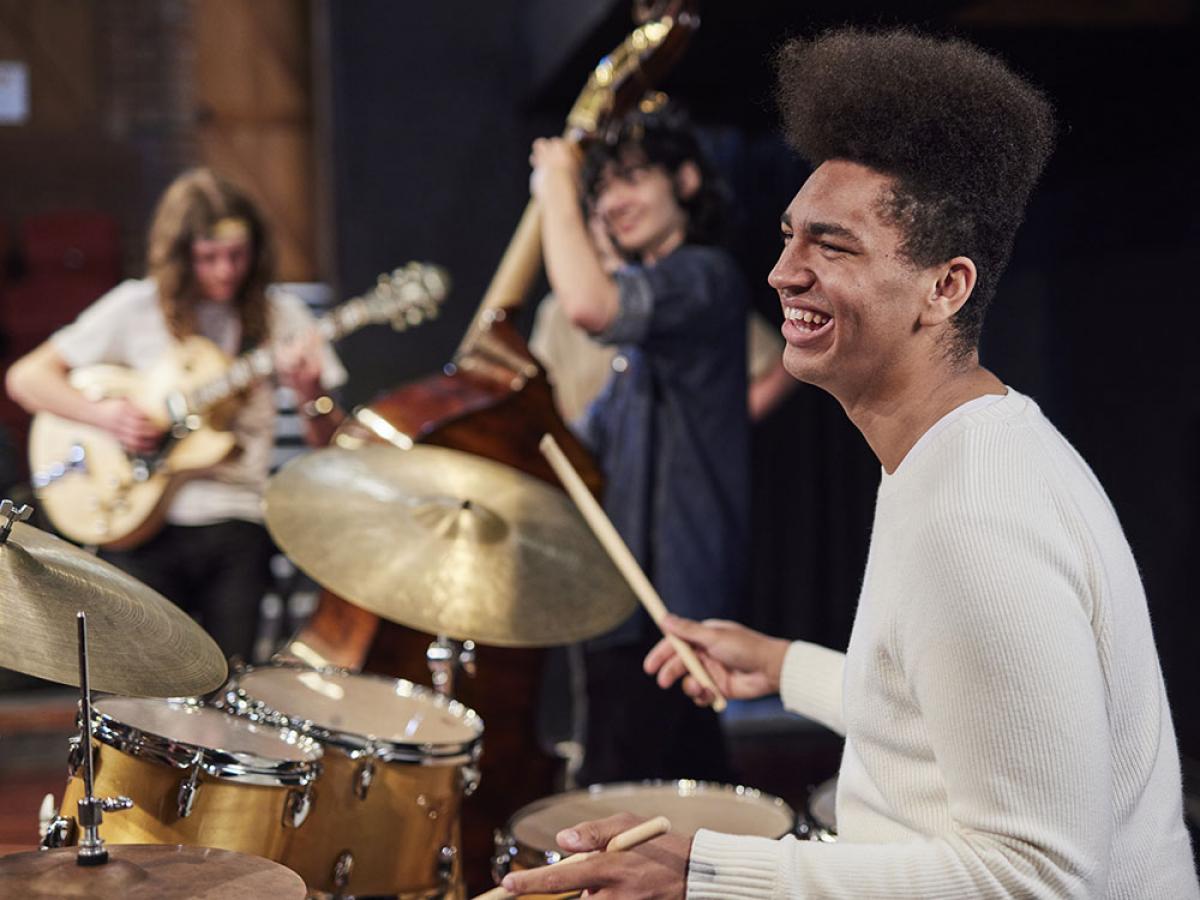
"Ensemble music making in orchestras, bands and choirs has been a vital part of music-making at the Elder Conservatorium for many years - it is central to our role as music educators and as musicians."Professor Anna Goldsworthy, Director, Elder Conservatorium of Music
Our ensembles
-
Elder Music Lab
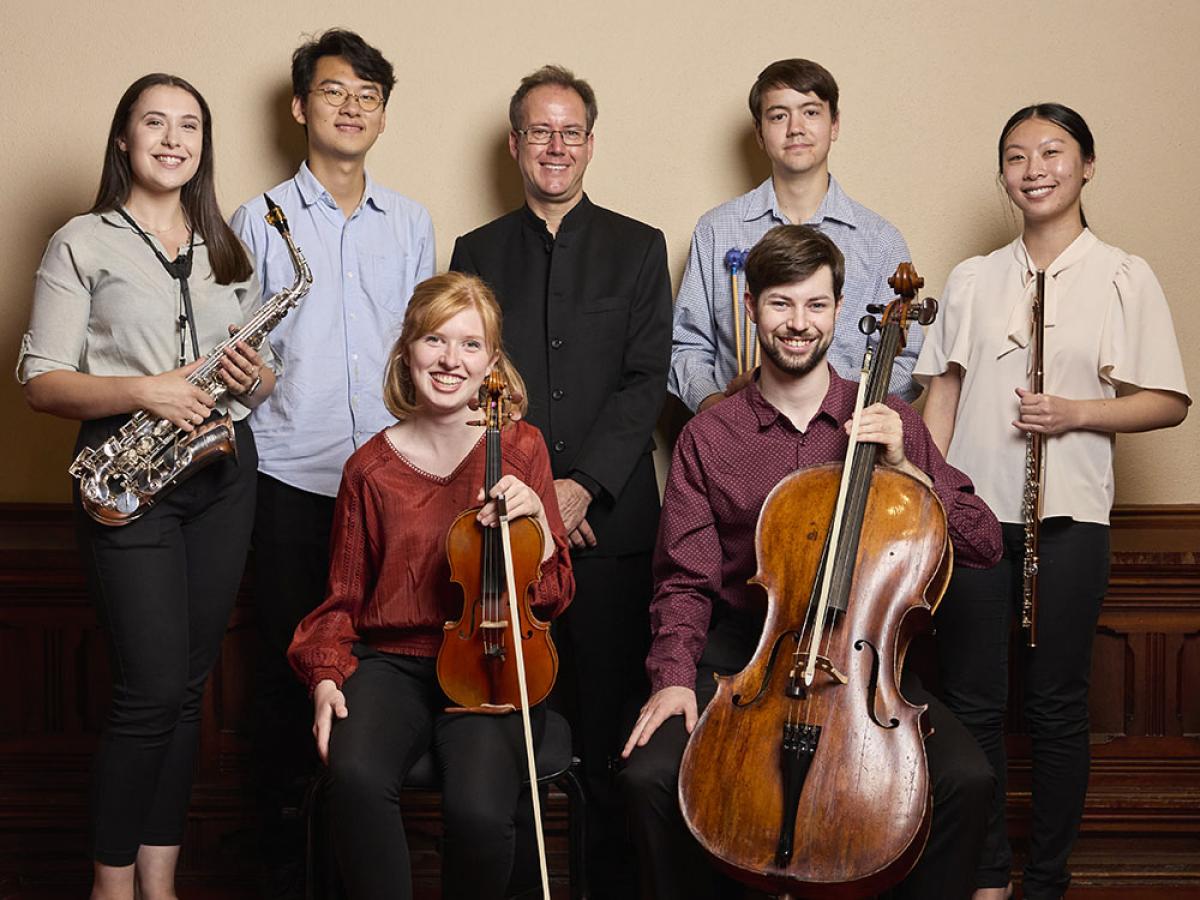
Director: Dr Luke Dollman
Elder Music Lab is the Elder Conservatorium of Music’s new music ensemble, providing a spearhead for the Conservatorium’s activities in the area of contemporary music, with a particular focus on generating and performing new works, and innovative performance practices in general.
Since its formation in 2017 the ensemble, directed by Luke Dollman, has given many performances at the University of Adelaide and has been a regular guest at COMA’s series at the Wheatsheaf Hotel.
Particular highlights have been composer focuses on Peter Maxwell Davies and Pierre Boulez, 18 world premieres and collaborations with various musicians from other genres.
Recent highlights include performing live online together with our colleagues from the Yong Siew Toh Conservatory in Singapore, and performing at the Adelaide Symphony Orchestra’s She Speaks festival celebrating female composers.
-
Elder Conservatorium Chorale
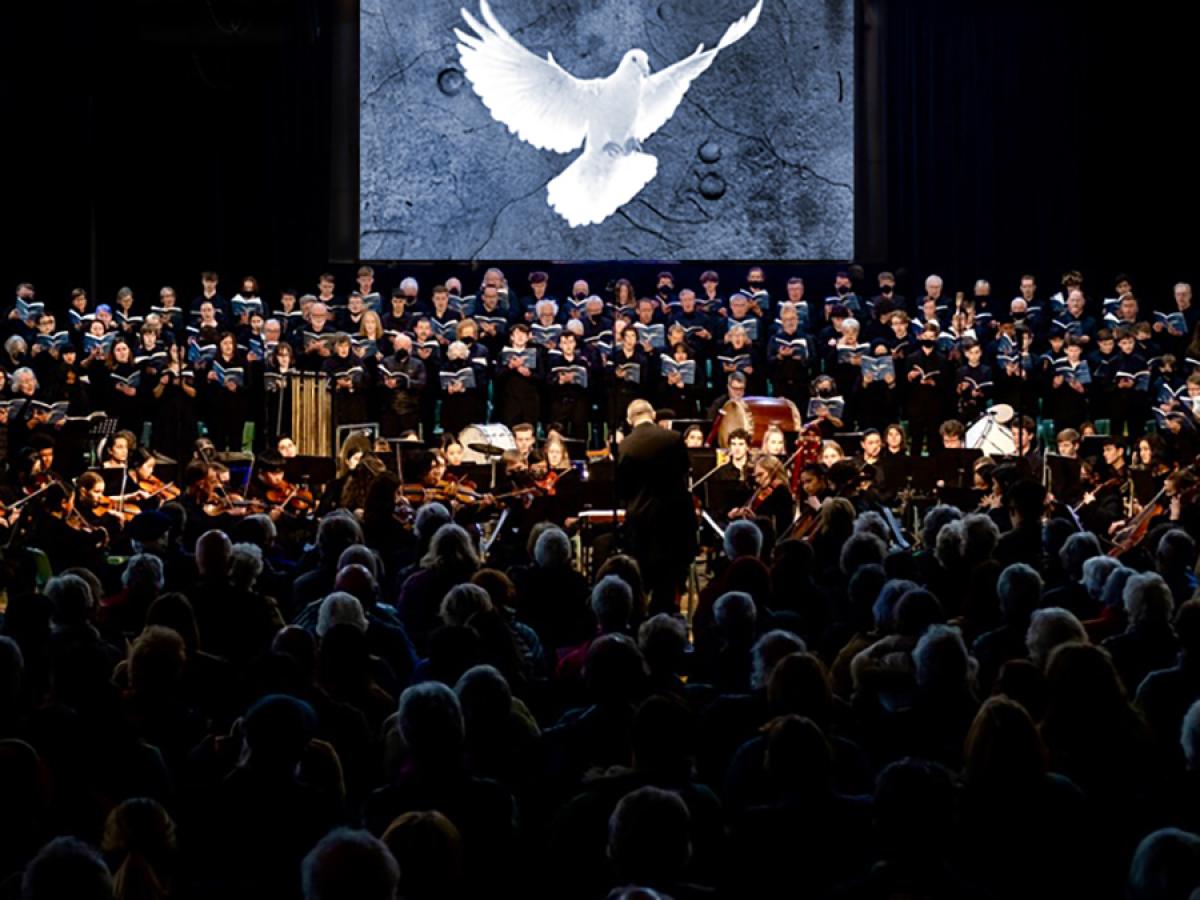
Director: Dr Carl Crossin OAM
The Choral Program at the Elder Conservatorium of Music is based on the fundamental principle that ensemble work is an essential part of any musician's education.
Choral music is one of the most universal of musical genres. It is an art form that possesses a diversity like no other and, at any level (from amateur to professional) choral singing involves artistic expression using the most natural and elemental of all instruments - the human voice.
The Elder Conservatorium Chorale is a vibrant mixed-voice auditioned choir which draws its membership from the Elder Conservatorium of Music, the University of Adelaide at large, other universities, and from the wider community.
The Chorale has been a vital and essential part of choral music-making in Adelaide for over twenty years. It has performed a wide variety of choral music, both unaccompanied and with orchestra, and ranging in style from Renaissance motets and Baroque oratorios; to gospel spirituals and innovative contemporary works. Chorale has also sung some of the greatest works of the choral /orchestral repertoire (many with the Adelaide Symphony Orchestra), including: Requiems by Mozart, Verdi, Brahms, Duruflé and Fauré; choral symphonies by Beethoven, Mahler and Vaughan Williams; oratorios by Handel (including Messiah) and both the St. John and St, Matthew Passion settings by Bach.
The Chorale is a regular collaborator with the Adelaide Symphony Orchestra and has also taken part in such diverse performances as Adelaide Festival concerts, several ‘live’ film scores (Harry Potter, Lord Of The Rings, Dr. Who and The Films of Tim Burton) and ‘Last Night of the Proms concerts.
-
Steve's Rhythm Ensemble
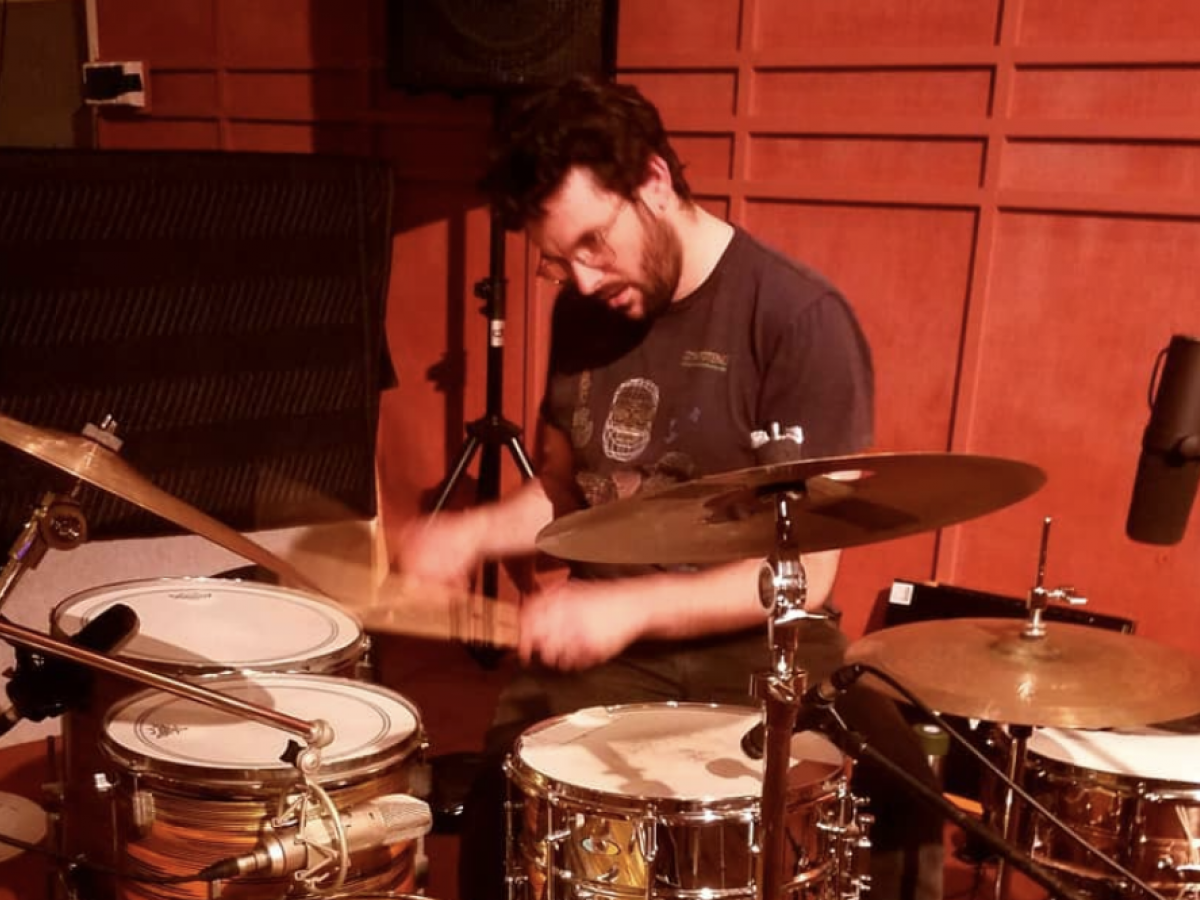
Director: Stephen Neville
Drummer Stephen Neville leads this new-ish ensemble which focusses on developing rhythm section skills. The group will workshop and perform repertoire from across the jazz and jazz-adjacent spectrum with a strong drive to understand the interconnectedness of the rhythms and grooves played by each ensemble member.
-
Adelaide Connection
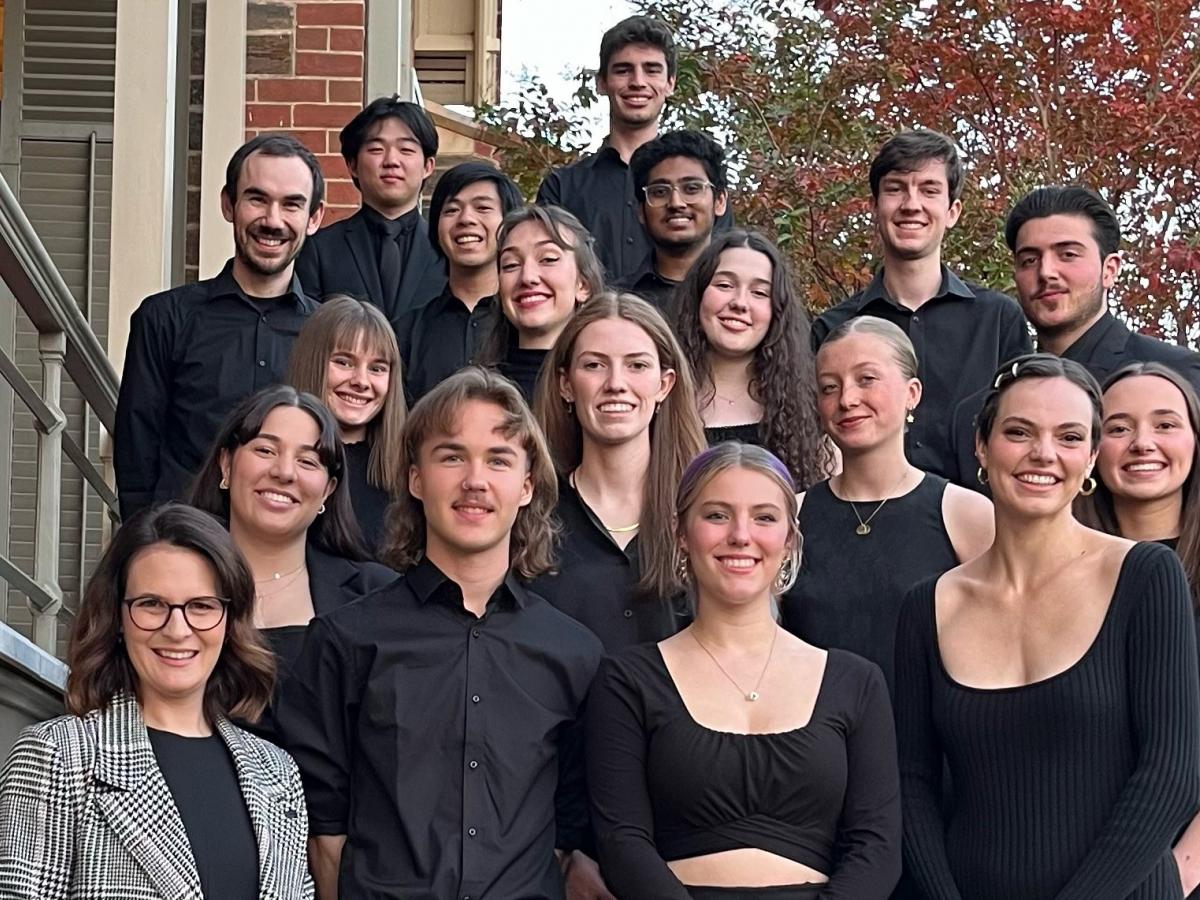
Director: Lauren Henderson
The Elder Conservatorium's premier jazz choir, Adelaide Connection, was arguably the very first jazz choir in Australia! The group was formed in 1981 by John McKenzie and is currently directed by Lauren Henderson, herself a former member, under the direction of Luke Thompson.
The ensemble has played a formative role in the careers of some of the most outstanding Australian jazz vocalists including Anita Wardell, Jo Lawry, Michelle Nicolle, Naomi Crellin, Luke Thompson (of the Idea of North) and Libby O’Donovan.
Adelaide Connection have released four albums, including Nice ‘n’ Easy which was an ARIA nominee for Best Jazz Album and featured Australian jazz legend Don Burrows (AOM) and his Quintet. They have performed at the International Association of Jazz Educator Convention in New York City, the Manly Jazz Festival, the Pacific Basin Choral Convention in Honolulu and have toured regularly nationally and internationally. Recently they have had a number of collaborations with the Adelaide Symphony Orchestra, performing at the inaugural Festival of Orchestra in 2021.
With a focus on harmonically sophisticated vocal music, both a cappella and accompanied, the ensemble is an excellent developmental tool in strengthening the students' knowledge of jazz history, sight reading and stylistic interpretation with repertoire spanning early jazz choral arrangers such as Gene Puerling to current arrangers such as Darmon Meader, Michelle Weir and Kerry Marsh.
-
The Wardells
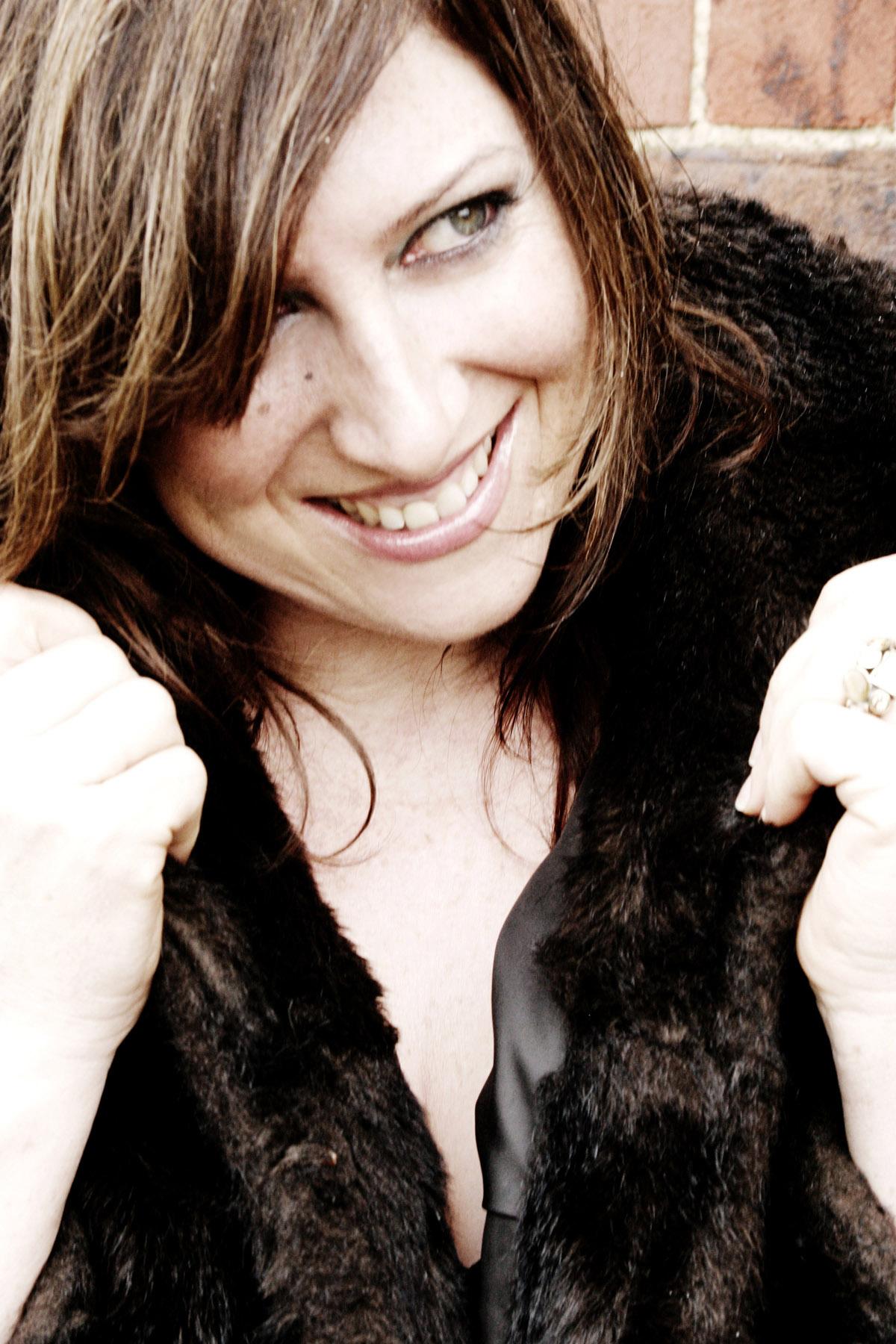
Born in 2025, The Wardells, an SSAA only jazz choir, is a tribute to the exceptional career of Anita Wardell, one of Australia’s leading jazz vocalists. Named in her honour, The Wardells were established to inspire and showcase Australia’s next generation of female jazz voices, fostering a deep appreciation for jazz and its rich traditions whilst embodying the spirit of innovation and excellence that Wardell herself represents.
Anita Wardell, the choir's namesake, made history as the first vocalist of The Elder Conservatorium to achieve international acclaim, paving the way for future generations of jazz vocalists. Her distinguished career as a jazz singer, renowned for her mastery of improvisation and vocal dexterity, earned her recognition both in Australia and abroad.
Wardell’s legacy is reflected in The Wardells commitment to pushing musical boundaries while maintaining a deep respect for the traditions of jazz. With a focus on ensemble work and individual artistry, the choir provides a platform for young singers to develop their skills in a collaborative and dynamic environment.
The Wardells’ repertoire spans classic jazz standards to contemporary arrangements, both accompanied and a cappella, showcasing their versatile vocal prowess. The choir’s arrangements highlight intricate harmonies and complex grooves, allowing each member to shine both individually and as part of a unified ensemble.
The Wardells continue to honour Anita Wardell's enduring influence on the jazz world, celebrating creativity, musicianship, and the power of voice in jazz, ensuring that her spirit lives on through the next generation of jazz performers.
-
Big Band
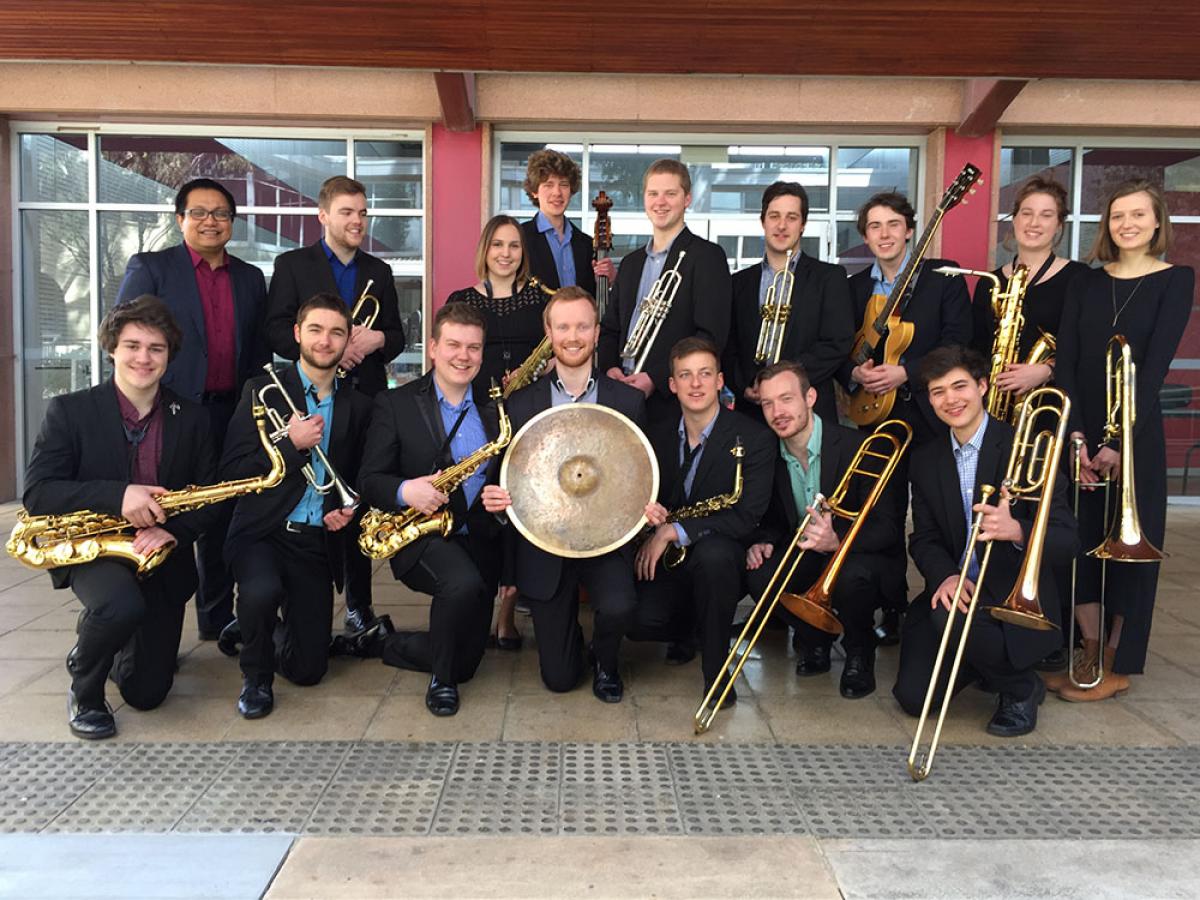
Director: Alex Taylor
The Elder Conservatorium Big Band was formed by the original Head of Jazz, Hal Hall in the late 1970’s. Under the direction of current leader Dusty Cox the Big Band received the 2009 ‘Outstanding College Performance’ award in DownBeat’s ‘32nd Annual Student Music Awards’, the first Australian University ensemble to receive this prestigious award.
The ensemble has worked with jazz giants, including Bob Mintzer, Lee Konitz, Wycliffe Gordon, Errol Buddle, Don Burrows, Michelle Nicolle, Ray Vega our own Lauren Henderson and Julian Ferraretto and many others. It has appeared at the Manly Jazz Festival three times; in 1995 it featured at the Montsalvat Jazz Festival, and in 2002 performed at the prestigious Wangaratta Jazz Festival.
The Big Band has also toured extensively throughout South Australia and in 1994 it produced a CD, Live at the Walker’s Arms and completed a further studio recording in 2008. The Open Music Academy at the Elder Conservatorium includes the Big Band in their many educational tours around South Australia in their outreach programs.
The band showcases a broad range of material from the traditions of Basie and Ellington to contemporary music from Maria Schneider, Michael Mossman and Head of Jazz Mark Ferguson.
Many alumni have gone on to very successful international careers as performers, composer/arrangers and educators. Leading artists such as Thomas Voss, Andrew Crago, Alex Flood, Ben Harrison and Adam Page spent their formative years in the band.
-
Latin Ensemble
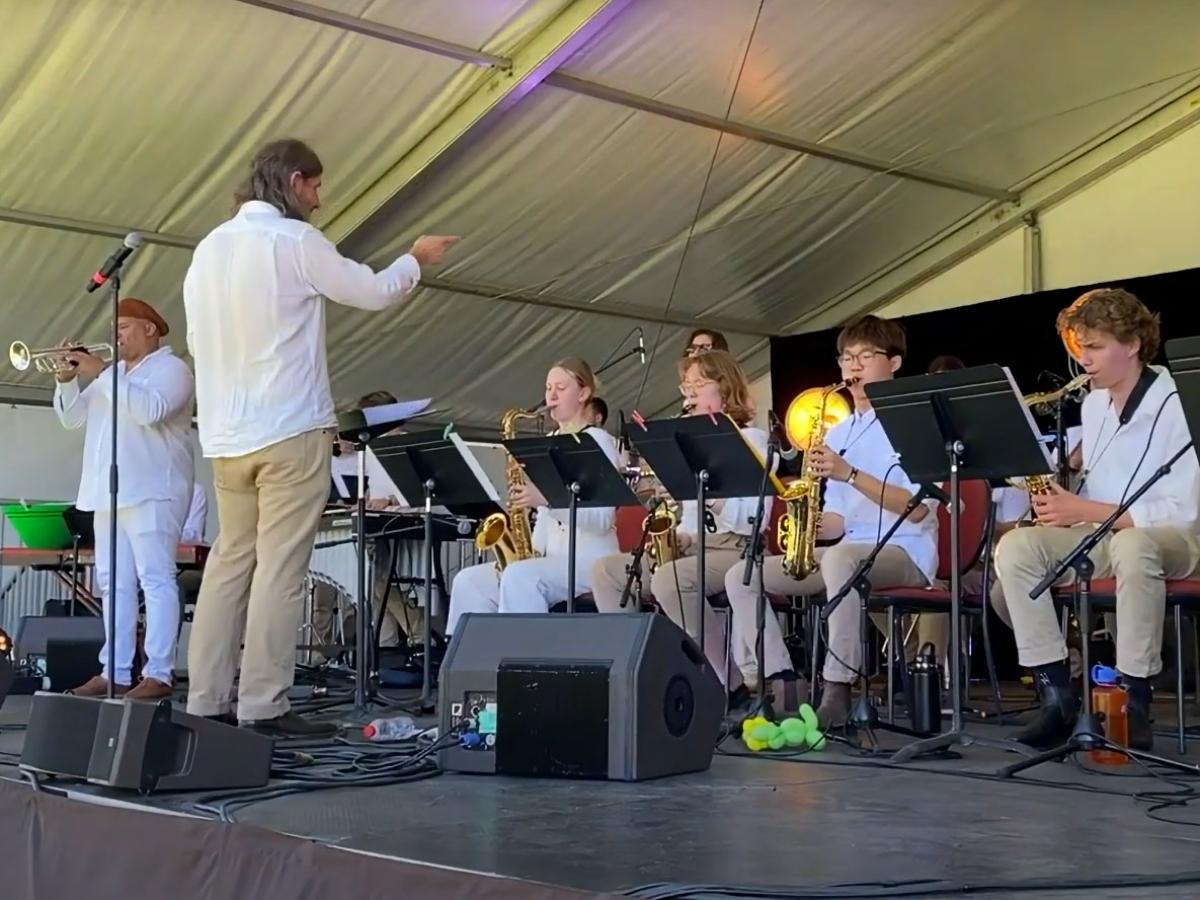
Director: Mark Ferguson
The Latin Ensemble was formed by current Head of Jazz Mark Simeon Ferguson in 2009. The band focuses on Afro-Cuban styles such Son, Mambo, Cha-cha, and guaracha but also explores some Brazilian, West African and Jazz Funk styles. The group features a semi-standard Big Band instrumentation plus three-to-five percussionists.
The Latin Ensemble have performed with internationally acclaimed Latin and Latin jazz artists including Elio Villfranca (Cuba/NYC), Ray Vega (NYC), Lazaro Numa (Cuba) and Fabian Hevia (Chile/Sydney). The have toured regional South Australia and perform regularly for Latin dance nights and featured in the Royal Adelaide Show.
The group’s repertoire features works by Eddie Palmieri, Chucho Valdez, Tito Rodriguez and Tito Puente alongside works by the director. Students are also encouraged to write for the group and many students in the Jazz Arranging class write their major work for the Latin Ensemble.
The ensemble spends a small portion of each rehearsal working through pages of rhythmic exercises designed to develop reading skills and to enhance student connection to the ‘groove’.
Many ensemble alumni now work professionally as Latin percussionists and focus heavily on congas.
-
Guitar Ensemble
Director: James Muller
Recently reformed under the direction of renowned jazz guitarist James Muller, the Elder Conservatorium Jazz Guitar Ensemble is a unique collective exploring the rich harmonic and rhythmic possibilities of jazz guitar. Featuring five guitars, supported by piano, bass, and drums, the ensemble delivers a fresh and dynamic sound.
The ensemble repertoire spans bebop to contemporary jazz, with all pieces arranged or adapted by James Muller. The ensemble performs works by iconic jazz guitarists such as Kurt Rosenwinkel, John Scofield, and Pat Metheny, alongside adaptations of jazz classics by Miles Davis, Joe Henderson, Freddie Hubbard, and Wynton Marsalis, and arrangements of jazz standards from the great American songbook.
With a strong emphasis on sight reading, ensemble cohesion, solo improvisation, and accompaniment, the ensemble provides a novel, immersive experience in jazz guitar performance, tradition and innovation.
-
Free Jazz Ensemble
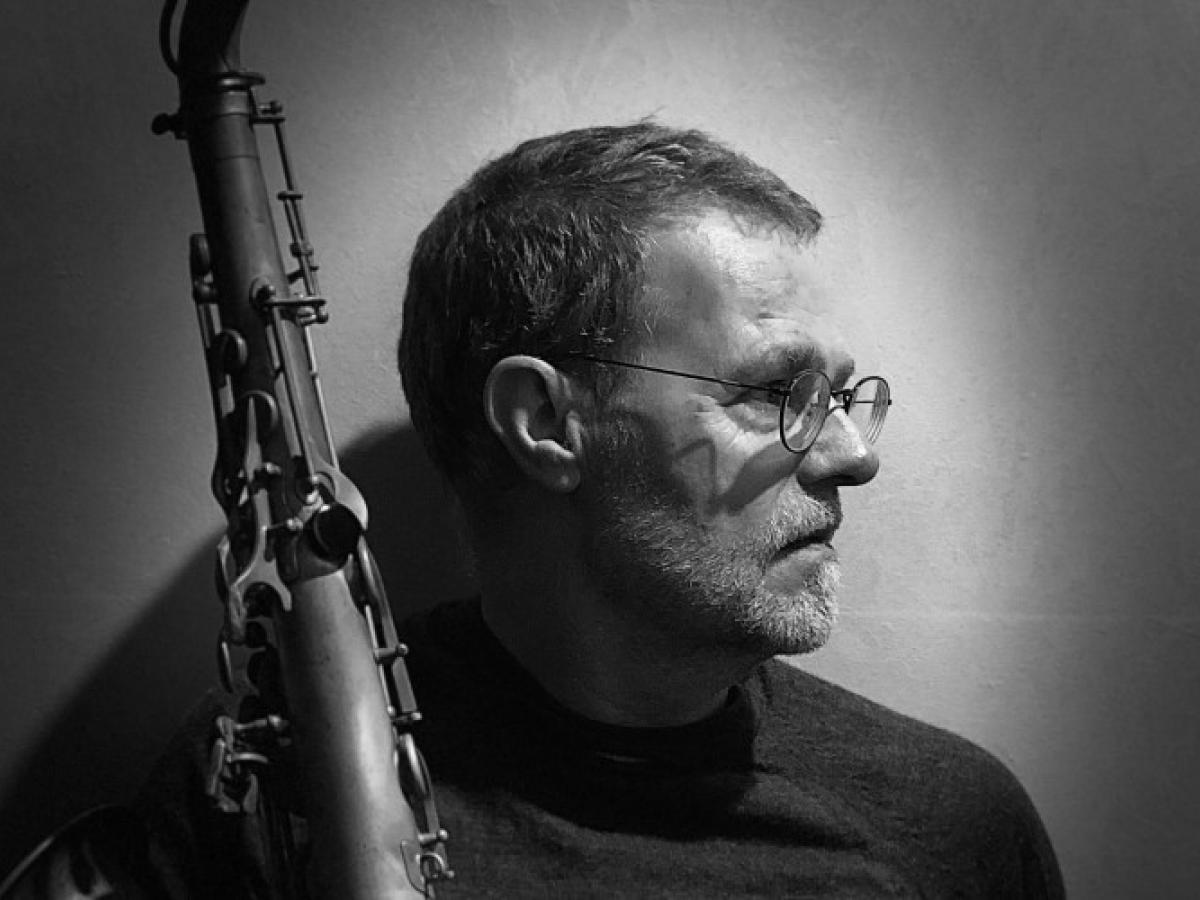
Director: Derek Pascoe
Saxophonist Derek Pascoe leads this new mixed ensemble which will encounter many different facets of the ‘free jazz universe’. The ensemble will explore some of the early approaches of Ornette Coleman’s bands, some of the mid-1960’s John Coltrane approaches alongside elements of the European traditions from the 1970’s onwards. The group will also explore what the free jazz movements have created in Australia and develop much of their own repertoire for performance.
-
Saxophone Ensemble
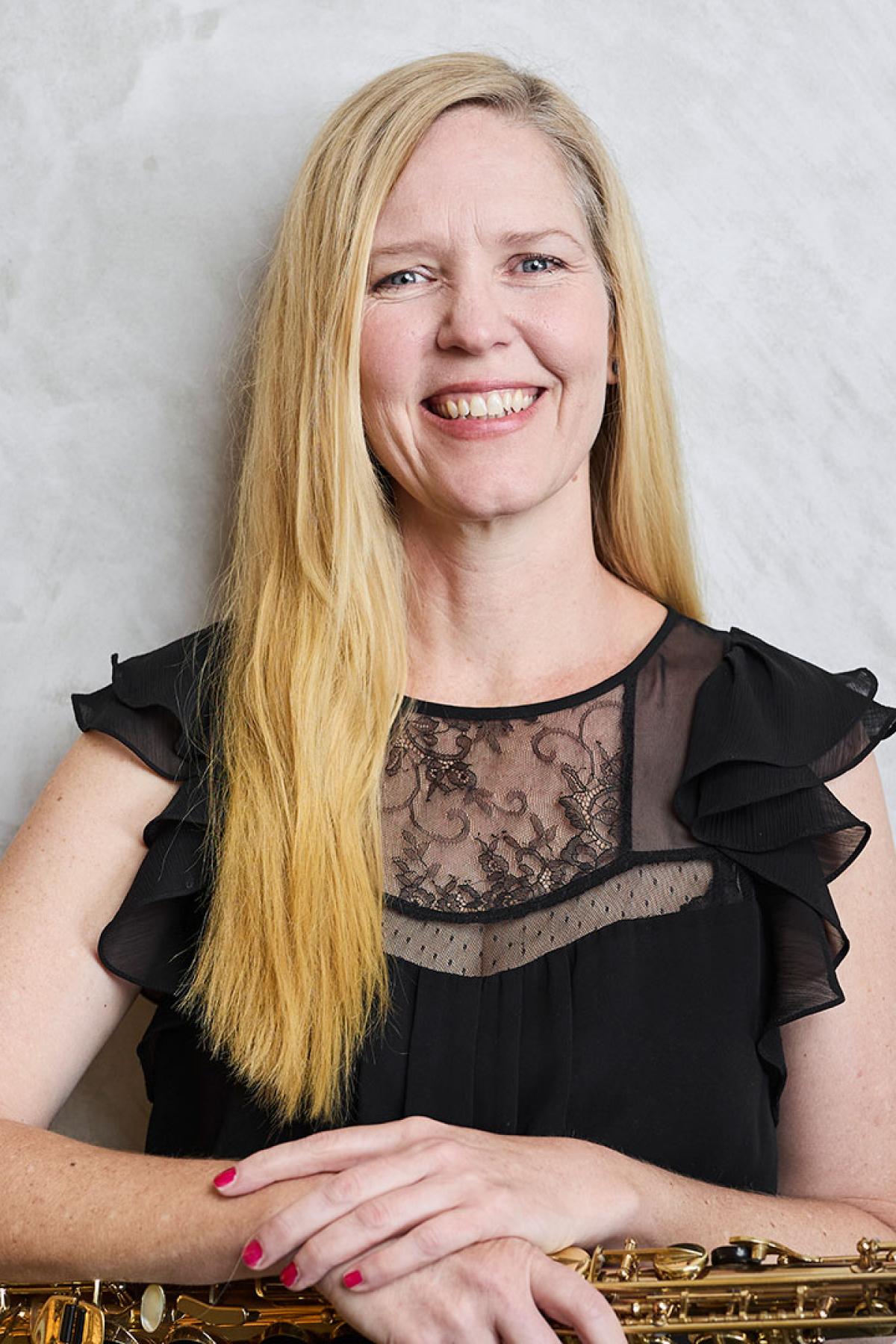
Director: Vashti Tyrrell
Saxophonist Vashti Tyrrell leads this new ensemble which features a standard Big Band saxophone section (alto x2, tenor x2 and baritone) and a rhythm section. Drawing on repertoire from SuperSax, Benny Golson, Benny Carter and works by local composers and arrangers this training group strives to develop strong ensemble skills—real-time active listening and responding skills, rhythmic security and for the saxophonists good blending, pitch-matching, vibrato-matching and dynamic-matching skills.
-
Small Jazz Ensembles
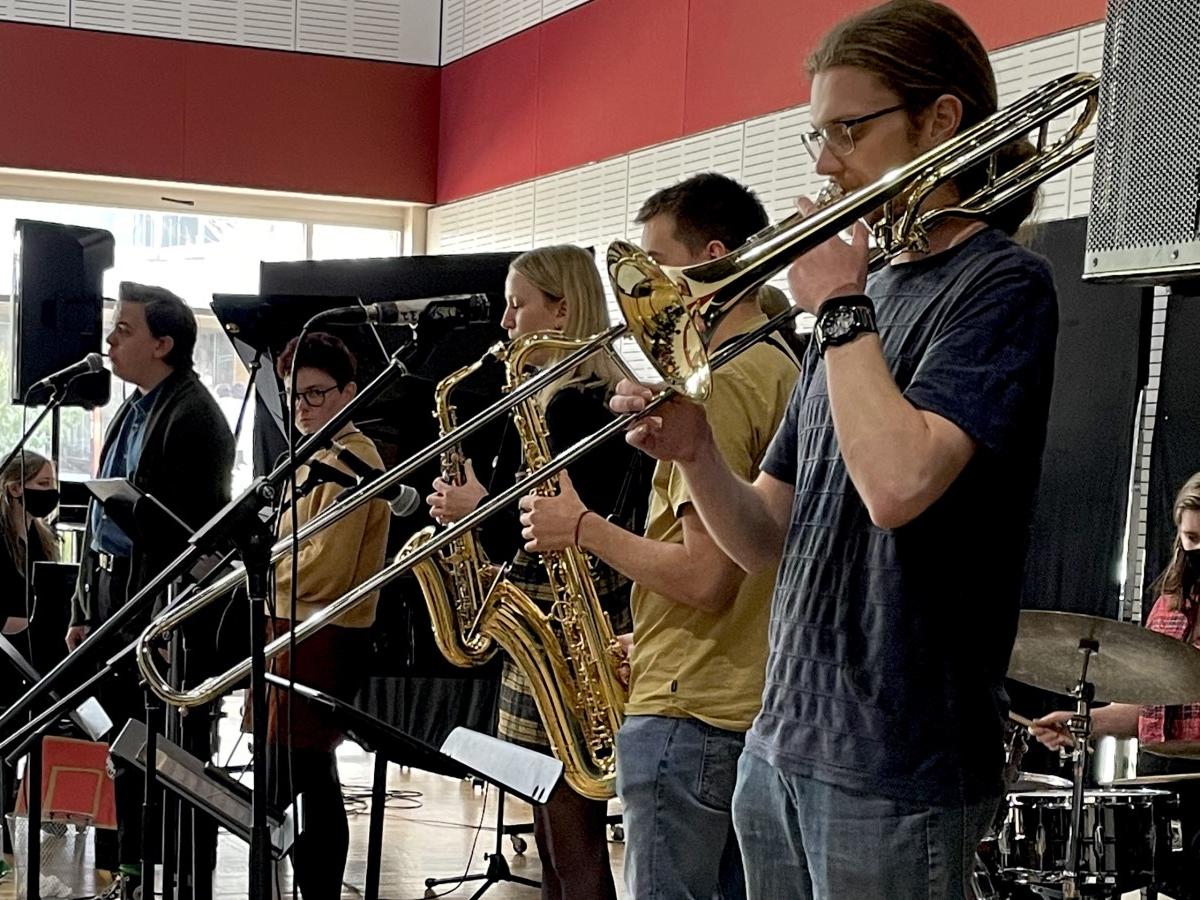
- Small ensembles are held in our teaching and practice rooms in the Madley building which all have small PA systems and pianos. Drummers need to bring their own drum kits. Most rooms have bass amps but we encourage bass players and guitarists to bring their own amps so they can work on developing their ‘sound’
- Our jazz vocal lecturer Lauren Henderson once described the small ensemble as ‘a family’ — with all the ups and downs that implies. Lifelong friendships regularly form in these groups, and skills in dealing with differing opinions while working towards common goals are an important outcome of this class.
- The small ensembles focus on tunes list repertoire but students are welcome to bring in other repertoire in consultation with the ensemble lecturer.
- The group has one hour of instruction with a lecturer per week as part of a scheduled two-hour session — the students direct themselves for the second hour
-
Elder Conservatorium Symphony Orchestra
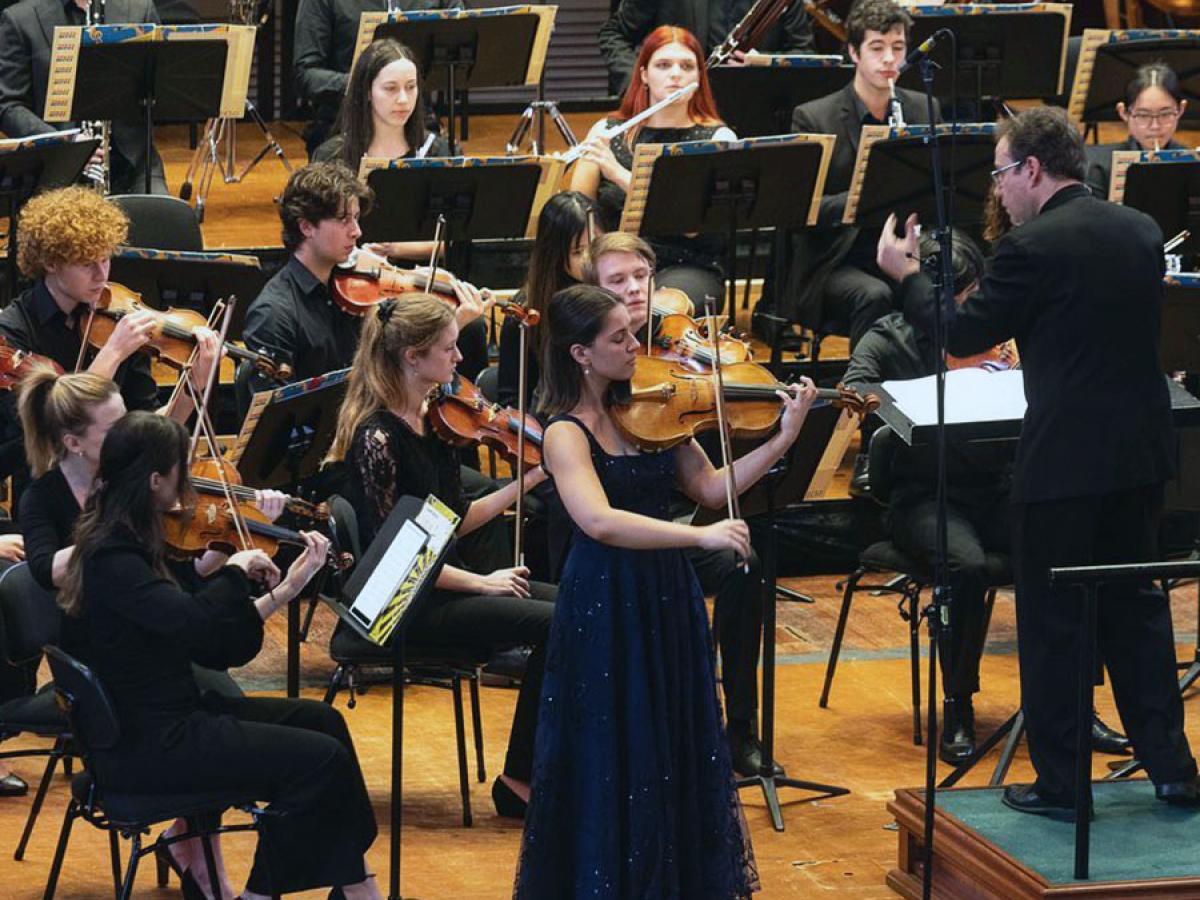
Director: Dr Luke Dollman
The Elder Conservatorium Symphony Orchestra (ECSO) is central to the work of the Elder Conservatorium and the training of its young musicians. The orchestra consists mainly of full-time students from the Conservatorium's music programs but also includes students from other faculties within the University. Our orchestral program aims to provide students with the ensemble expertise necessary for a successful performing career at the highest level and was recently awarded a Silver Medal at the World Orchestra Festival held in Vienna.
Dr Luke Dollman is the current Music Director of the orchestra, while guest conductors in recent years have included Nicholas Braithwaite, James Lowe and Graham Abbott. The orchestra performs a wide variety of traditional orchestral repertoire and regularly performs new works by Elder Conservatorium students and staff. The orchestra also provides a platform for our most promising students to perform concertos in our prestigious Elder Hall Lunchtime Series. Regular auditions are held in February as part of Orientation Week, however we welcome enquiries from musicians interested in playing throughout the year.
-
Elder Conservatorium Wind Orchestra
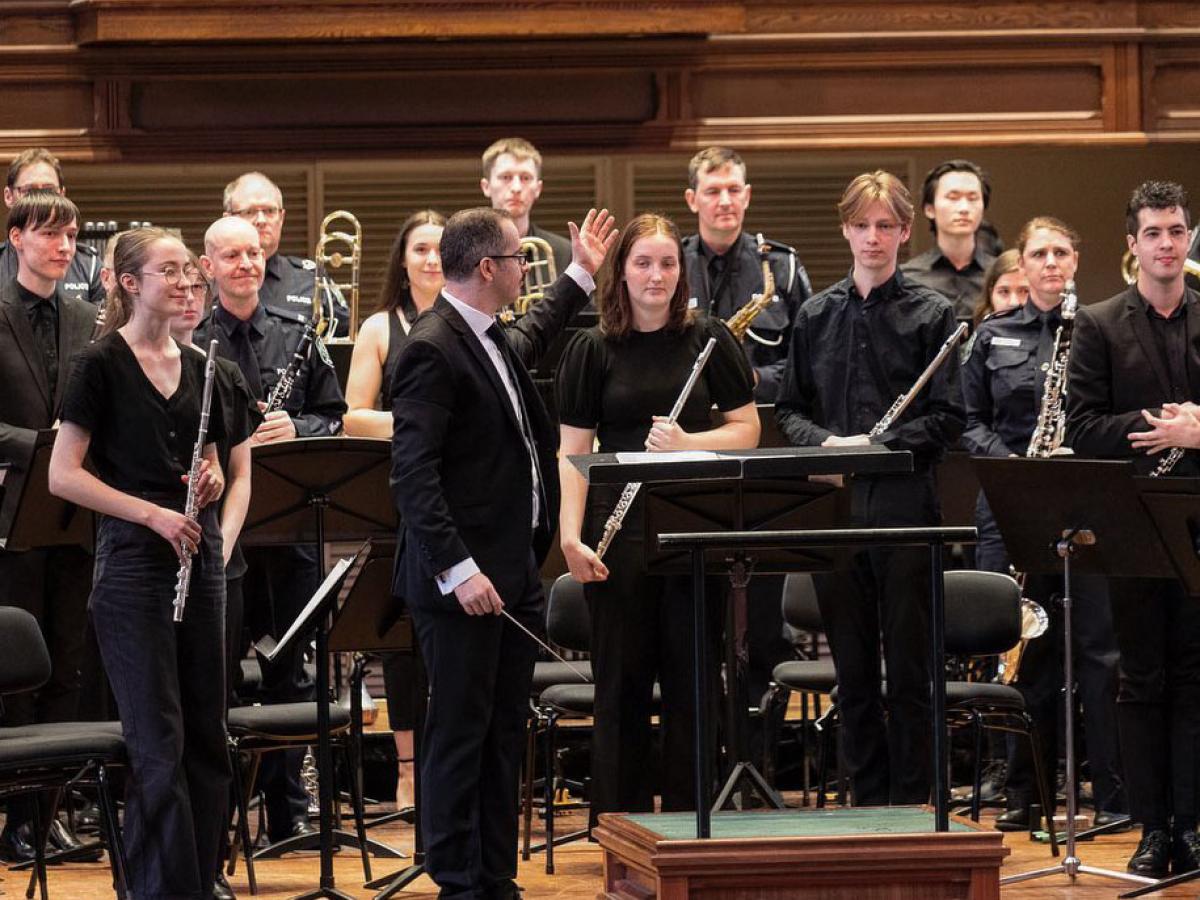
Director: Lloyd Van't Hoff
The Elder Conservatorium Wind Orchestra (ECWO) is widely recognised for its pioneering role in and ongoing contribution to the Australian wind orchestra movement. Forming an integral part of the professional performance training and teacher education at the Elder Conservatorium of Music, the ensemble is comprised primarily of music-majors but welcomes talented and dedicated students from the wider University cohort.
Under the directorship of the late Robert 'Bob' Hower (1953-2019)—a graduate of the Eastman School of Music—the ensemble received numerous invitations to perform in concerts and festivals locally, interstate and abroad, including the Australian National Band Championships where it was regularly awarded winner of the Open A Grade Concert Band division. In 1996, ECWO and Hower recorded composer David Stanhope’s then complete works for wind orchestra for the album Little Ripper!.
ECWO has collaborated with a number of distinguished partners for the benefit of its students, most notably in the 2003 and 2010 residencies by British conductor Timothy Reynish, a world authority on wind orchestra performance and repertoire. In recent years, the ensemble has regularly partnered with the Band of the South Australian Police in concert, providing members with specialist professional mentoring and experience. Many ECWO alumni go on to distinguished careers in both Australian and overseas orchestras, defence and service bands.
-
Elder Conservatorium Chamber Orchestra
Director: Dr Elizabeth Layton
Founded in 1973 by the late Jiri Tancibudek, the Elder Conservatorium Chamber Orchestra draws on advanced students from the Conservatorium. In its first either years, the orchestra studied and performed over sixty works including full-scale operas such as Mozart's Idomeneo and Cosi fan Tutte, and concert works by Haydn, Schubert, Dvorak, Tchaikovsky, Elgar, Bartok and many others. In 1998 the orchestra was reformed by William Hennessy, the founding leader of the Australian String Quartet and since then has performed regularly in lunch hour and evening concerts.
The chamber orchestra provides students with the opportunity to hone their ensemble skills in an orchestral setting and to work on the vast repertoire available to such an ensemble. In addition, by working with the chamber orchestra, students have the opportunity to study many of the stylistic techniques which they will encounter in their professional lives.
-
Elder Conservatorium Percussion Ensemble
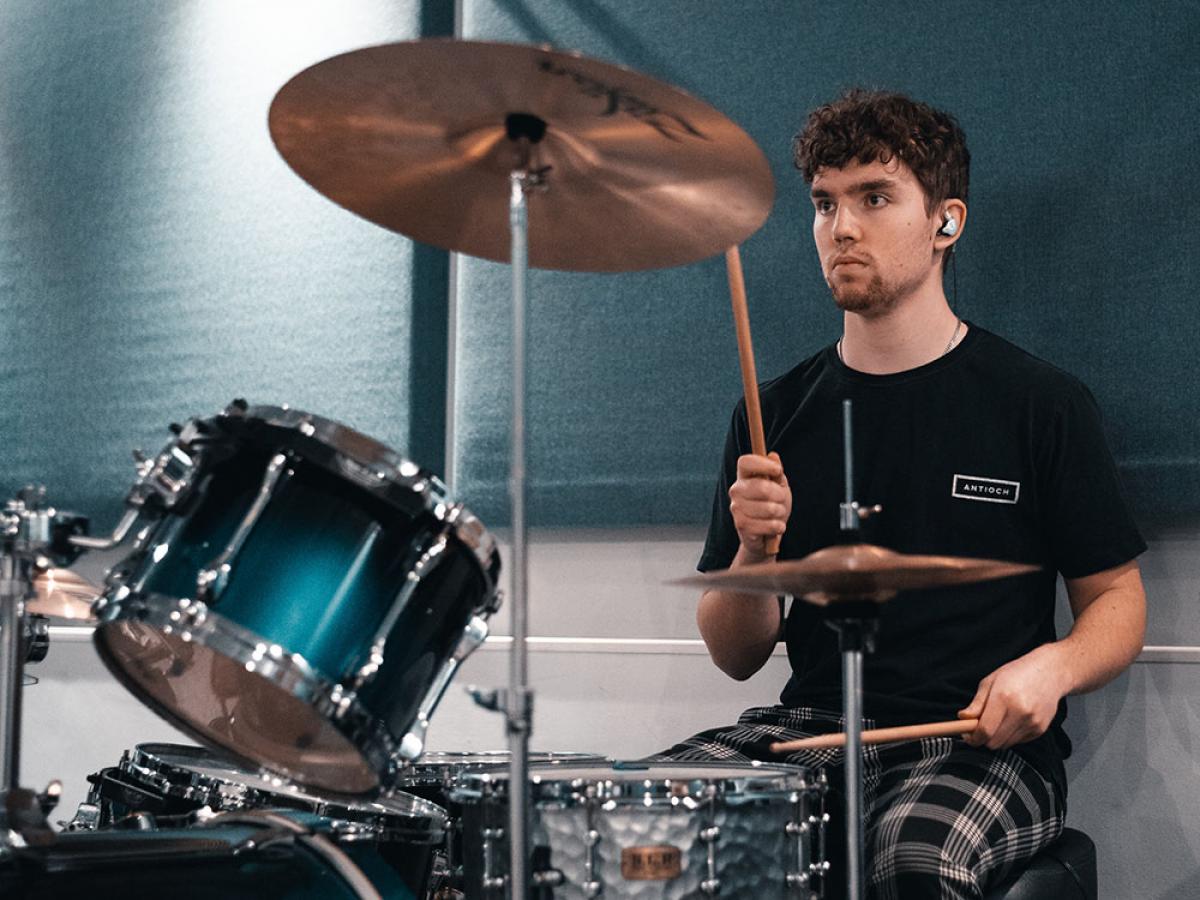
Director: Amanda Grigg
The Elder Conservatorium Percussion Ensemble rehearses weekly and performs regularly throughout the semester. All percussion students are keen members, however other students are welcome to audition at the beginning of the year.
As a participant of percussion ensemble, you will;
- Have access to an extensive percussion studio and rehearse in a supportive and creative environment.
- Gain a comprehensive knowledge of percussion ensembles, their history and repertoire.
- Play a variety of instruments from standard orchestral percussion through to world music.
- Enhance your musicianship though individually focused instruction and coaching.
- Contribute artistically though performances, workshops, and sessions with visiting artists.
-
Elder Conservatorium Brass Ensemble
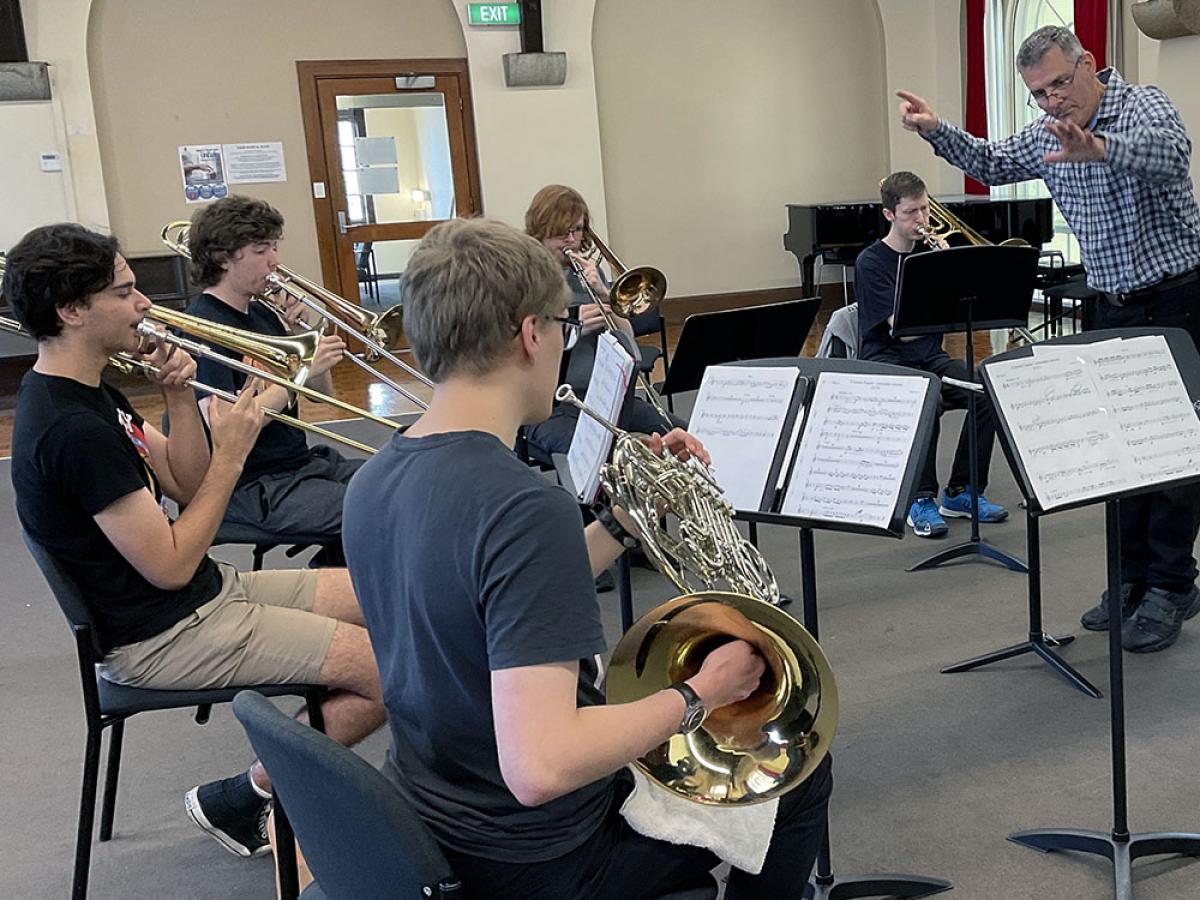
Director: Emma Gregan
The Elder Conservatorium Brass Ensemble is where brass students are exposed to the large repertoire that has been composed and arranged specifically for orchestral brass. The repertoire and style of playing differs greatly from the traditional brass band.
In the Brass Ensemble setting we are very focused on the sound, articulation and style of playing that will directly relate to orchestral playing.
The ability to listen and blend sound, to play with beautiful sound and perfect intonation, and to play consistently at a professional level is our aim.
Ensemble auditions Feb 2026
All Elder Conservatorium of Music ensemble activities are housed under the umbrella course 'Music Professional Development (levels 1-3)' (MPD). Students will not be able to enrol in MPD until after they have completed an ensemble audition - these auditions are separate to the one to gain entry to the Conservatorium. Auditions for the ensembles will take place during O'Week, and are open to non-music students.
-
Classical auditions
Session Day Date Start Finish Venue Map ref Large ensemble auditions: Brass
Mon 16 Feb 9am 12pm Madley Rehearsal Studio F4 Large ensemble auditions: Percussion
Wed 18 Feb 10am 12pm Madley Percussion Studio F4 Large ensemble auditions: Woodwind
Thu 19 Feb 1pm 4pm Hartley Concert Room G3 Large ensemble auditions: Strings
Thu 19 Feb 1pm 4pm LG12 (Elder Hall lower ground) L11 -
Jazz auditions
Ensemble auditions will be held during O'Week on Tuesday 17 February 2026, 10am to 5pm in the Madley basement rooms.
Audition details and sign-up sheets (note that the spreadsheet has 4 tabs!)
Audition notes:
There are eight large jazz ensembles running at the Elder Conservatorium:
Big Band directed by Alex Taylor
Adelaide Connection SATB choir directed by Lauren Henderson
The Wardells SSAA choir directed by Lauren Henderson
Latin Ensemble directed by Mark Ferguson
Jazz Guitar Ensemble directed by James Muller
Steve's Rhythm Ensemble directed by Stephen Neville
Saxophone Ensemble directed by Vashti Tyrell
Free Jazz Ensemble directed by Derek PascoeFor the LARGE ENSEMBLE component of Music Professional Development each jazz student will attend a Skills Development class AND a relevant large instrumental ensemble or choir. See the Audition details and sign-up sheet link above for information.
Each jazz student must attend a Skills Development audition AND their relevant instrumental or choir audition.
Put your name, instrument and uni email address in a relevant spot.
We STRONGLY encourage all instrumentalists with a choral background to audition for the choirs!
We STRONGLY encourage all vocalists who have good instrumental skills to audition for the large instrumental ensembles.
We STRONGLY encourage other music students and non-music students with relevant skills to audition for the large ensemble program. As always we have a greater need for trombone, trumpet, and voice of the tenor, baritone and bass persuasion.
Large ensemble schedule:
**Waiting on timetabling for room confirmations
Please note: all large ensembles are now 9-11am, not 11am-1pm. They have swapped with small ensembles!
MONDAY
9:00-9:50am Skills Development (various teachers)
10:00-10:50am Sectionals (various teachers—more than 2025!)TUESDAY
9:00-10:50am Adelaide Connection (Lauren Henderson)
9:00-10:50am Saxophone ensemble (Vashti Tyrell)
9:00-10:50am Steve's Rhythm and Reading ensemble (Steve Neville)WEDNESDAY
9:00-10:50am The Wardells (Lauren Henderson)THURSDAY
9:00-10:50am Big Band (Alex Taylor)
9:00-10:50am Guitar ensemble (James Muller)
9:00-10:50am Free Jazz ensemble (Derek Pascoe)FRIDAY
9:00-10:50am Latin Ensemble (MFerguson)The Skills Development audition is new in 2026. Don’t stress out if you have never tried sight singing or never sung before—we just want to hear what you can do now so we can help you along this journey.
-
Choir auditions
Chorale auditions will be held during O'Week on the following days:
- Thursday 19th of February in Hartley 106 from 1:00PM - 5:00PM - Click here to sign up
- Friday 20th of February in Hartley Concert Room from 1:00PM - 5:00PM - Click here to sign up
Audition requirements
The audition will be relatively informal, and user friendly - it has three components.
In the audition, you will be asked to…
- Sing a short, lyrical song or excerpt from a song without accompaniment. The choice of song is yours – it may be a song, or it may be your part from a choral piece you know.
This part of the audition enables you to show your voice within the context of actually making music - singing phrases, engaging with text and showing your musicality. It also allows you to show your ‘workable’ range – and there may also be a short ‘range test’!
- Complete a few short aural tests – This includes singing back some simple phrases after you hear them a couple of times, as well as singing the lowest or middle note(s) of various 3 and 4 note chords. The tests become increasingly complex to test the limits of your aural skills.
This part of the audition enables us to get a sense of your aural skills and your ability to hear and sing inner parts.
- Sight-sing a couple of short melodies These tests start with a simple example and may progress to more challenging examples! They may also include ‘rhythm only’ examples.
This part of the audition enables you to show how well you can read music using only your voice.
Naturally, you will be given the tonic chord and starting note for each sight-reading excerpt.
The audition usually takes about 8-10 minutes.
Looking for a student musician?
Give your event some pizzazz with a student musician from the Elder Con.
